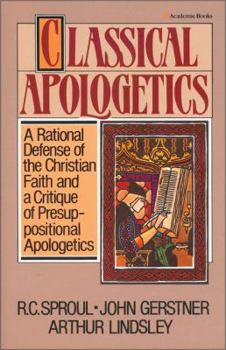Classical Apologetics: A Rational Defense of the Christian Faith and a Critique of Presuppositional Apologetics
Select Format
Select Condition 
Book Overview
A Rational Defense of the Christian Faith and a Critique of Presuppositional Apologetics. Must a person accept Christianity on faith alone, or is there a reasoned defense for being a Christian? The authors of this book hold that Christianity is eminently reasonable. The primacy of the mind in the Christian faith can be affirmed without denying the importance of the heart. This book embraces reason without rationalism, personal...
Format:Paperback
Language:English
ISBN:0310449510
ISBN13:9780310449515
Release Date:July 1984
Publisher:Zondervan Academic
Length:384 Pages
Weight:0.94 lbs.
Dimensions:1.0" x 5.6" x 8.5"
Age Range:18 years and up
Customer Reviews
5 ratings
CLASSICAL Apologetics, not Presuppositional
Published by Thriftbooks.com User , 17 years ago
This is a solid exposition of classical apologetics, which considers the reality and necessity of the use of evidence in approaching some non-believers with Christian truth claims. It offers a strong, and IMHO valid, critique of Van Tillian Presuppositionalism. Even the evidence we have that God exists derives from God. However, if we only assume God must me accepted to be known, we are guilty of circular reasoning and the average, educated non-believer will see through this. Presuppositionalism is fine if you're content only to sway the uneducated... (That may be a harsh statement, too, but I agree withe the premise of this book.)
legends.
Published by Thriftbooks.com User , 23 years ago
This work which has been so explosive, especially in the Reformed family, should be bought by every child of the Canons of Dort. Many, many, critiques notwithstanding, this work in my mind has not been refuted to date. Bob Sproul and his mentor, John Gerstner follow in the line of the Old Princetonians. They prove themselves in the succesion of Warfield. Sproul, Gerstner & Lindsey devestate the school of Van Till. This work belongs on the shelf of both friend and foe. H.S Bultmann.
This is the magnum opus of apologetics!
Published by Thriftbooks.com User , 25 years ago
This is without a doubt the foremost book on classical apologetics, and the first attempt ever to give a comprehensive critique of presuppositionalism. It summarizes both natural apologetics (the theistic arguments) and supernatural apologetics (the historical evidence for Scripture). Van Til is the main focus of the criticism, but other presuppositional writers like Clark, Dooyeweerd, Frame, and Knudsen are included. There is also a key chapter giving great detail to the evidence that Augustine, Luther, and Calvin were all evidentialists, despite popular charges that that they were not. This book is a must for anyone trying to understand apologetics and the issue involved between the two vastly different types of apologetics!
Good Critique of Presuppositional Apologetics, but...
Published by Thriftbooks.com User , 25 years ago
Sproul rightly critiques Van Til's contradictions about whether non-Christians have "true" knowledge of God. Sproul argues that they do in accordance with Romans Chapter One and shows that Van Til inconsistently admits that they do also even though in other places he says or implies that they don't. One does not need to "presuppose" God because, according to Romans One (and Sproul), all have at least some knowledge of God through God's natural/general revelation. This allows for a common ground between Christians and non-Christians. But Sproul, being a Classical Apologist, still thinks that one must posit proofs for God's existence even though everybody apparently already knows God exists. This is confusing. Sproul, on pages 262 and 263, basically says that the primary task of the apologist is to not let the non-Christians who argue against the truth they already know "escape" by "reminding" them of "arguments which they cannot deny." This, to me, is a ridiculous and weak justification for doing Classical/Traditional apologetics. If God's existence is taken for granted in the Bible (including Romans 1), and nowhere proven because everybody apparently already knows that God exists, then theistic apologetics (distinct from Christian evidences) is a waste of time. (side note: I agree with Mortimer J. Adler who said that "true knowledge" is redundant and "false knowledge" is a contradiction in terms) - Brad Clark
Excellent scholarly work
Published by Thriftbooks.com User , 27 years ago
This book is a mixture of philosophy, church history and theology. It lays down the foundations of apologetics and of the intellectual enterprise. It is very interesting but the style is sometimes too lengthy. The 1st part sets the problem of fideism and secularization, and responds with natural theology and logic. The 2nd part Deals with the religious knowledge, proofs and scripture. It has some very good discussions on miracles, the Holy Spirit, etc which are not found elsewhere. the treatement of the ontological arguement is not very clear. The 3rd part deals with the absurdities of Presuppositionalism. It deals with with the ideas of Dooyeweerd, Van Til, John Frame and others. their ideas are ideas so incredibly absurd that I wonder if they deserved such lengthy expositions and refutations. This part may also be a good corrective to those who have read the writings of Francis Schaeffer or have been influenced by his ideas. The book is not always easy to read and may be too difficult for "uneducated" readers.





